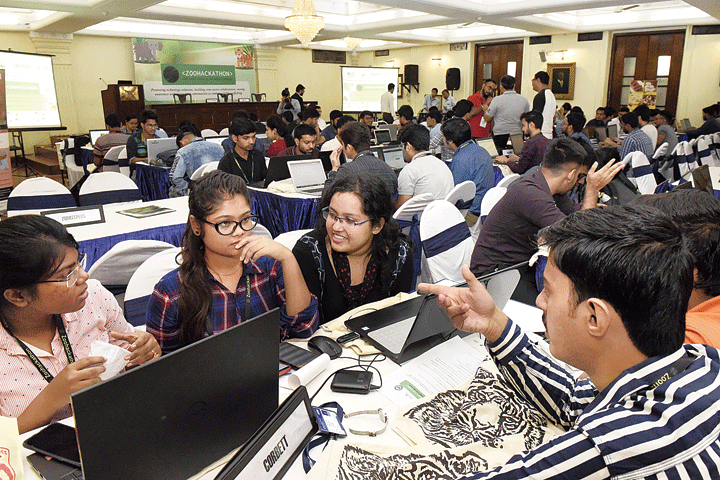About 50 men and women worked through two days to find technological solutions to the biggest challenges in protecting India’s forests and wildlife.
This was the first time Zoohackathon, a competition where innovative technological solutions are sought from participants to combat illegal wildlife trade, was held in Calcutta on November 9 and 10.
The event was held for the first time in India in 2017 in Delhi. The event is also being held in Mumbai this year. Eighteen teams took part in the competition being held across 16 locations in 14 countries this year.
The participants developed websites, software and mobile applications that would make the protection work easier and more comprehensive for India’s forest protectors of both government and non-government organisations.
The teams were given problem statements that included both illegal animal and timber trade, and they were expected to come up with technological solutions to the problems.
One of the organisers said that illegal wildlife trading was done through use of code words that were common among traders. “It is like Feluda telling Topshe in Joy Baba Felunath to bring the packet of sweets. But what he actually meant was Topshe should bring the gun along,” said an organiser.
The organiser gave the example to elucidate how illegal trading is done using code wards.
In Zoohackathon, the participants came up with new software that made a database of the code words that would send alerts to forest departments and NGOs whenever an illegal trade is being discussed. Mere use of a code word can trigger an alert about a potential illegal trade attempt.
The participants would only create the solutions, which would then have to be taken up by government agencies or NGOs for enforcement.
A six-member team (Pineapples) from the St Thomas College of Engineering and Technology won the first prize.
Team member Arghajit Christopher Gomes said that they had developed a software that would help the protectors get a detailed idea of which animal parts were in demand, when and what were the price.
“Anyone has to log in to the software and search by an animal’s name. All detailed information about the price, which parts are in demand, in which month and in which part of the state or country can be found out just through a search,” said Gomes.
All the team members are second-year students of computer science and engineering.
Gomes said that the software would get weekly or daily updates by which even latest trends would get stored in its database and could be found while searching. He added that the software they made in the competition could be scaled up with time and funding.
Merwyn Fernandes, a co-ordinator for Traffic India, said that much of the illegal wildlife and timber trader happened on the Internet and social media and better vigilance of the virtual media was important to curb the menace.
The US Consulate Calcutta, WWF India and Bengal Chamber of Commerce and Industry jointly organised the city leg of Zoohackathon.
An engineer said that the solutions coming from the competition would trigger an alert whenever such code words are used in a phone conversation or in an online chat or in any social media platform. One of the problem statements sought a solution to illegal trade of timber using block-chain technology. The engineer said that the block-chain technology could trace a product right from its origin.
“The trademark quality of block-chain technology is traceability. It can trace all transactions. So by using the technology it is possible to trace the illegally obtained timber,” said the engineer.
“The US Department of State runs Zoohackathon, a global competition to develop new and innovative technological tools to fight wildlife trafficking. US embassies and consulates around the world host Zoohackathon events following the hackathon model. Over 48 hours, university students, coders, scientists, and wildlife enthusiasts, collaborated in teams to create software solutions to actual wildlife conservation problems,” said Sonia Laul, political and economic officer, US Consulate Kolkata
A team of judges in each of these locations would select a winner and a runner-up among the participating teams. “The solutions provided by the 16 winning teams will take part in a global competition in Washington D.C,” said one of the organisers.
“It’s just heartening to see young brilliant minds come together, collaborate together and try to come up with technical solutions to a global problems,” said Krish Das, the deputy director, American Centre.
Some of the participating institutions were JIS College or Engineering, IEM, Narula Institute of Technolocy, Guru Nanak Institute of Technology and St Thomas College of Engineering.











